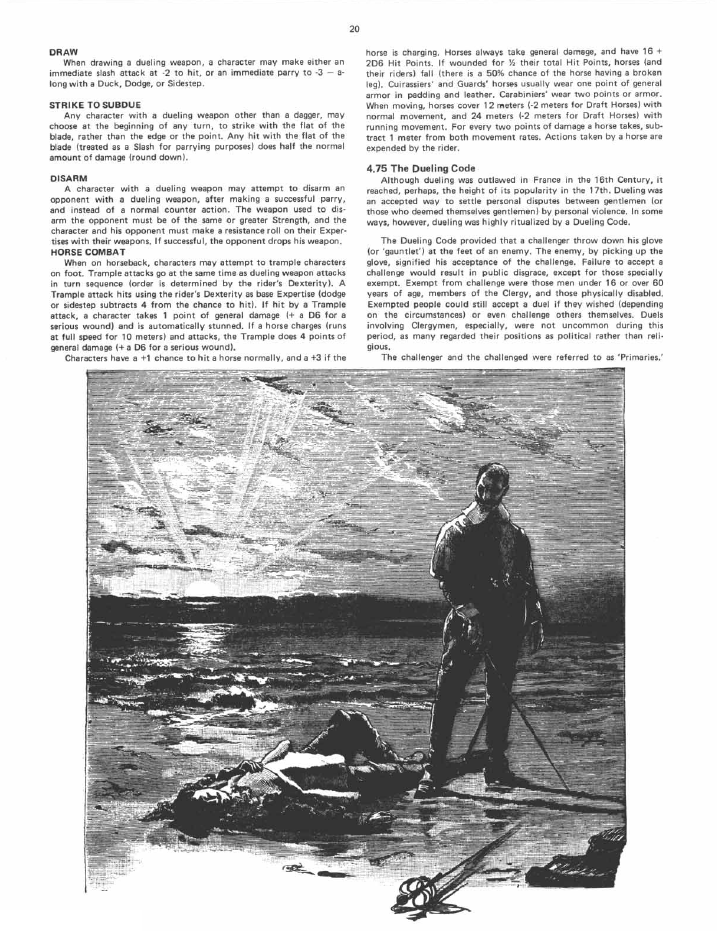In a post at EN World, Ethan Skemp coined the phrase "Verbal Kint method of GMing" to describe a method of preparing random encounters.
I'm intrigued by randomness because I'm always keeping an eye out for potential structure that can help me move things along when I don't have an immediately fantastic idea, or an immediately obvious way in which a situation will play out. Sometimes that structure is rolling a die and then making myself hold to some interpretation of what the die roll means. Sometimes it's drawing in structure from an external source: running a St. Patrick's Day-themed game, for instance, wherein I may have to figure out a way to make something leprechaunish relevant while concealing the source from the players. Or basing villains off tracks on a semi-randomly chosen album and never letting the players know.(Fair warning: if you haven't seen The Usual Suspects and you want to be surprised by the ending, you're forewarned that the video and the rest of the post contain spoilers.)
Call it the Verbal Kint method of GMing, I guess: find some structure in the world around you to act as a skeleton, let the logic of the game world add flesh and blood and skin, and there you go. The extra structure means you're often trying out new things, and adhering to it is good discipline.
Through this series of posts I've been using the structure provided by the rules for encounters and events from a variety of different games - Flashing Blades, Rory's Story Cubes, Backswords & Bucklers, Robots & Rapiers, Mythic Role Playing - as a tool for preparing the chance encounters which populate my game-world. The encounters I generated are not only random in their appearance in actual play, but by the process of their creation as well. The 'external structure' provided by a die roll, or a shuffled track on my iPod, or an adventure scenario generator, helps me to break out of the creative ruts into which my mind might otherwise settle. But, while well suited to advance preparation away from the table, some of these methods are admittedly a bit impractical to use in real-time, with the players waiting expectantly.
So, how would I go about Verbal Kint-ing an encounter at the table?
When called on to improvise in actual play, most of us pull from our knowledge of the game-world and the context of the adventurers' present circumstances. There are any number of external structures from which we could also draw inspiration, from music playing in the background to miniatures on the table to a passing comment from one of the players to the weather outside. But absent a bulletin board covered with wanted posters and dispatches and a porcelain coffee mug, I've found one source to be particularly useful and relevant to the task: the rule book.
If I'm working from my actual printed copy of Flashing Blades, this is particularly easy - the random encounters are located at the back of the book, so I simply flip through the pages, and the first three pages at which I stop are my inspiration. If I'm working from my pdf of the rules, on the other hand, I program three '1d24' into my random roller, take the first result as the first page, add the first two results for the second page, and add all three results for the third page.
Going back once more to the random encounter tables, my roll of 1d20=12 on the Encounter at Palace table is, "A Bishop, with 1d6=2 Curia Members (a possible Patron)" - his Patronage roll is 1d20=8, "The Patron wishes to have a message taken to someone in a dangerous position (a prisoner in the Bastille, perhaps, or a soldier on the front)."

Putting it together, the bishop of ____________ knows of the adventurers on the basis of their dueling exploits. He invites them to dinner. Through the meal, the prelate makes inquiries about the adventurers' exploits, as well as bits of court gossip, to test their honor and reserve, and if he's satisfied they are men of discretion, the bishop will explain that he seeks trustworthy messengers to carry a letter to a Flemish banker in Antwerp - Dutch ships and soldiers have recently attacked outworks around the city, and the journey is expected to be perilous. The bishop offers the adventurers a generous reward for their service.
The letter? A bank draft for the purchase of tulip bulbs, drawn on the diocese's accounts - the bishop is speculating in foreign commerce using Church funds.
And with that my series on random encounters, randomly created, concludes. It's not necessary, or even desirable, to do this for every chance encounter the adventurers face - there's nothing wrong with "Orcs (1-4)" or "1D6 Highwaymen" playing out exactly as advertised. But chance encounters need not be 'ran-DUMB,' either. In my campaigns, chance encounters represent the living game-world around the adventurers, and by generating the content randomly, in or out of actual play, I force my imagination to turn the corners on familiar paths in search of undiscovered country.

No comments:
Post a Comment
All comments are moderated so please be patient.